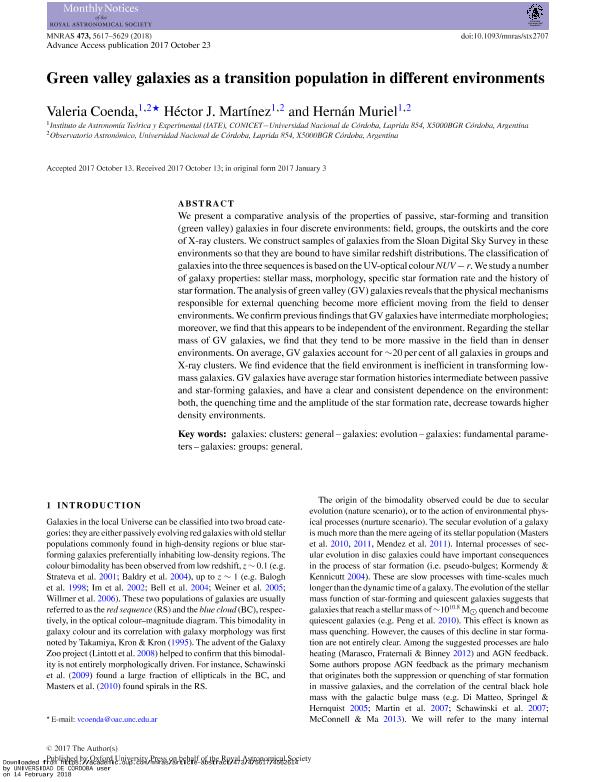Mostrar el registro sencillo del ítem
dc.contributor.author
Coenda, Valeria

dc.contributor.author
Martinez Atencio, Hector Julian

dc.contributor.author
Muriel, Hernan

dc.date.available
2019-10-22T17:44:13Z
dc.date.issued
2018-02
dc.identifier.citation
Coenda, Valeria; Martinez Atencio, Hector Julian; Muriel, Hernan; Green valley galaxies as a transition population in different environments; Wiley Blackwell Publishing, Inc; Monthly Notices of the Royal Astronomical Society; 473; 4; 2-2018; 5617-5629
dc.identifier.issn
0035-8711
dc.identifier.uri
http://hdl.handle.net/11336/86922
dc.description.abstract
We present a comparative analysis of the properties of passive, star-forming and transition (green valley) galaxies in four discrete environments: field, groups, the outskirts and the core of X-ray clusters. We construct samples of galaxies from the Sloan Digital Sky Survey in these environments so that they are bound to have similar redshift distributions. The classification of galaxies into the three sequences is based on theUV-optical colourNUV-r. We study a number of galaxy properties: stellar mass, morphology, specific star formation rate and the history of star formation. The analysis of green valley (GV) galaxies reveals that the physical mechanisms responsible for external quenching become more efficient moving from the field to denser environments. We confirm previous findings thatGVgalaxies have intermediate morphologies; moreover, we find that this appears to be independent of the environment. Regarding the stellar mass of GV galaxies, we find that they tend to be more massive in the field than in denser environments. On average, GV galaxies account for ~20 per cent of all galaxies in groups and X-ray clusters. We find evidence that the field environment is inefficient in transforming lowmass galaxies. GV galaxies have average star formation histories intermediate between passive and star-forming galaxies, and have a clear and consistent dependence on the environment: both, the quenching time and the amplitude of the star formation rate, decrease towards higher density environments.
dc.format
application/pdf
dc.language.iso
eng
dc.publisher
Wiley Blackwell Publishing, Inc

dc.rights
info:eu-repo/semantics/openAccess
dc.rights.uri
https://creativecommons.org/licenses/by-nc-sa/2.5/ar/
dc.subject
GALAXIES: CLUSTERS: GENERAL
dc.subject
GALAXIES: EVOLUTION
dc.subject
GALAXIES: FUNDAMENTAL PARAMETERS
dc.subject
GALAXIES: GROUPS: GENERAL
dc.subject.classification
Astronomía

dc.subject.classification
Ciencias Físicas

dc.subject.classification
CIENCIAS NATURALES Y EXACTAS

dc.title
Green valley galaxies as a transition population in different environments
dc.type
info:eu-repo/semantics/article
dc.type
info:ar-repo/semantics/artículo
dc.type
info:eu-repo/semantics/publishedVersion
dc.date.updated
2019-10-17T15:19:37Z
dc.identifier.eissn
1365-2966
dc.journal.volume
473
dc.journal.number
4
dc.journal.pagination
5617-5629
dc.journal.pais
Reino Unido

dc.journal.ciudad
Londres
dc.description.fil
Fil: Coenda, Valeria. Consejo Nacional de Investigaciones Científicas y Técnicas. Centro Científico Tecnológico Conicet - Córdoba. Instituto de Astronomía Teórica y Experimental. Universidad Nacional de Córdoba. Observatorio Astronómico de Córdoba. Instituto de Astronomía Teórica y Experimental; Argentina
dc.description.fil
Fil: Martinez Atencio, Hector Julian. Consejo Nacional de Investigaciones Científicas y Técnicas. Centro Científico Tecnológico Conicet - Córdoba. Instituto de Astronomía Teórica y Experimental. Universidad Nacional de Córdoba. Observatorio Astronómico de Córdoba. Instituto de Astronomía Teórica y Experimental; Argentina
dc.description.fil
Fil: Muriel, Hernan. Consejo Nacional de Investigaciones Científicas y Técnicas. Centro Científico Tecnológico Conicet - Córdoba. Instituto de Astronomía Teórica y Experimental. Universidad Nacional de Córdoba. Observatorio Astronómico de Córdoba. Instituto de Astronomía Teórica y Experimental; Argentina
dc.journal.title
Monthly Notices of the Royal Astronomical Society

dc.relation.alternativeid
info:eu-repo/semantics/altIdentifier/doi/http://dx.doi.org/10.1093/mnras/stx2707
dc.relation.alternativeid
info:eu-repo/semantics/altIdentifier/url/https://academic.oup.com/mnras/article-abstract/473/4/5617/4562614?redirectedFrom=fulltext
Archivos asociados
